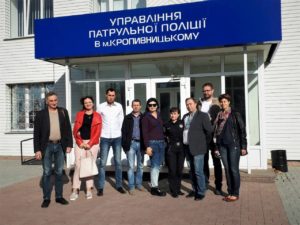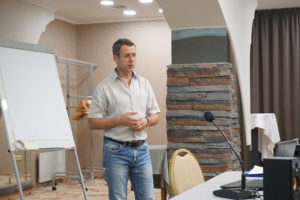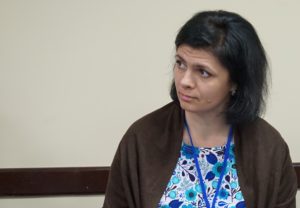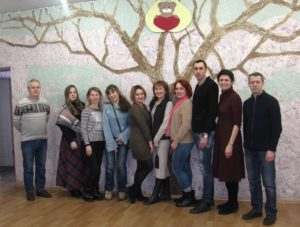 For many years, NGOs have been engaged in study tours with visits to various organizations and institutions in other countries. While experience shows that not all study tours are equally useful – sometimes practices that work well abroad are incompatible with local realities – study tours have overall proven to provide participants with new knowledge and valuable practices that can be applied.
For many years, NGOs have been engaged in study tours with visits to various organizations and institutions in other countries. While experience shows that not all study tours are equally useful – sometimes practices that work well abroad are incompatible with local realities – study tours have overall proven to provide participants with new knowledge and valuable practices that can be applied.
AFEW-Ukraine, partner in the “Bridging the Gaps: Health and Rights for Key Populations” programme, has noticed that at the local level partners benefit from sharing knowledge and experiences. Whereas each organization has its own reality and experience, NGOs all work in similar conditions. Since 2016, AFEW-Ukraine is regularly involved in the organisation of study tours for representatives of public organizations and government agencies, and colleagues working in other regions of Ukraine.
For Oleksandr Mohylka, Project Coordinator at the Compass Social House (KCF “Blago”, Kharkiv) and Nataliia Zlatopolska, Project Coordinator at the Altair Youth Friendly Center (PRCF “Public Health”, Poltava) study tours in Ukraine have proven to be an inspiration for bringing about change in their organisations and for their work with adolescents using drugs.
Where?
 Oleksandr: As part of the project “Bridging the Gaps” this year, two social workers and me went to the CF “New Family” in Chernivtsi and their Psychosocial support center “Dialogue”. We wanted to know about their rehab program for teens. This was important for us because we wanted to provide rehabilitation services for adolescents who use drugs.
Oleksandr: As part of the project “Bridging the Gaps” this year, two social workers and me went to the CF “New Family” in Chernivtsi and their Psychosocial support center “Dialogue”. We wanted to know about their rehab program for teens. This was important for us because we wanted to provide rehabilitation services for adolescents who use drugs.
 Nataliia: We had two trips to Kropyvnytskyi and Kharkiv. In Kropyvnytskyi we visited colleagues from the Social bureau “Lily” (CF “Return to Life”) and their partners in the city. In addition to Altair employees, we included representatives of the center for vocational training education, the department of juvenile prevention and the city center for family, children and youth.
Nataliia: We had two trips to Kropyvnytskyi and Kharkiv. In Kropyvnytskyi we visited colleagues from the Social bureau “Lily” (CF “Return to Life”) and their partners in the city. In addition to Altair employees, we included representatives of the center for vocational training education, the department of juvenile prevention and the city center for family, children and youth.
The choice of partners for the trip was not accidental. For example, the practice has shown that our clients are mainly students of vocational schools, and through direct interaction with management, it is easier to connect with this group, to make our work process systematic to reach more people and achieve positive dynamics. Juvenile prevention redirects clients to us, and we engage them in training project leaders.
In Kharkiv, we had the opportunity to get acquainted with the experience of their Compass Center. First of all, we were interested in what tools the organization uses to work with our target audience, and how their partners’ network works.
Goal
Oleksandr: We had a very tight trip. It was interesting how the rehabilitation was organized – statutes on rehabilitation, the program, orders of local authorities etc. This is what we can apply now in our everyday work. It was interesting to learn how it all began to work, why there was a need for certain documents, what mechanisms these documents regulate, what is the role of the City Coordination Mechanism. We were also interested in the interaction of the “New Family” with the Coordination Council since this is a positive experience of interaction.
Nataliia: We had a meeting with the deputy mayor of Kropyvnytskyi for humanitarian issues, a dialogue showed that the public sector in Kropyvnytskyi understands what benefits it has from working with NGOs. Project specialists proved the importance of interacting with them with the help of numbers, statistics, cases, and stories. And we took this experience forward.
We also saw how the ideas of the project clients are implemented. We saw that they are really possible to fulfil. And these are not just dreams – it is actually possible to realize the ideas of adolescents. For example, we liked the idea of sketching the addresses of Telegram drug distribution channels, not on their own, but using the resources of the city.
What was learned?
Oleksandr: It was after the trip to Chernivtsi that we made a firm decision that we would do a rehabilitation program. And we realized that we should do our own program, not the same as in Chernivtsi. The drug scene and, accordingly, the behaviour of adolescents and the consequences of using drugs change. Thanks to the trip to Chernivtsi, we now better understand how to take into account the unique experience of our colleagues and to make our rehabilitation program maximally meet modern challenges. We have already presented our idea to the Coordinating Council of Kharkiv. In the new City drug program, the development and support of a rehabilitation center for youth are now registered on the basis of our Social home! We were inspired by their experience and success; we saw that this is all real in our country. Moreover, now, apart from the “Dialogue”, no one is doing rehabilitation separately for teenagers in Ukraine. We always say that in Ukraine we have the experience of a successful rehabilitation center for adolescents and that we learn from them and are ready to contribute.
Nataliia: We “brought” new work tools home – for example, a step-by-step mechanism for referral clients from our city partners (educational and law enforcement agencies, social services, etc.) to us. In Kropyvnytskyi, if one of the key partners discovers a teenager who is probably using drugs, he or she will immediately be redirected to the social bureau “Lily”. And we studied communication mechanisms, registration log and so on. We also liked the practice of the leaders’ school. In addition, we spied on the work in the organizations themselves, how employees interact and were inspired by their atmosphere.
Oleksandr: Study tours with partners to colleagues from Ukraine are a very high-quality mechanism for obtaining of well-deserved trust from government bodies and our main partners – the police, social services, educational and medical institutions. Such joint actions help them understand that we are doing real things, we are doing things that government agencies are not doing because of limited resources, instructions or something else. But the main thing is that we complement their work very well. We let them know that we are ready to help and train. We noticed that upon returning, even the level of relations changed, as well as the number of redirects to the Center. At the same time, during such study tours, we ourselves see how government bodies work and what kind of help they need.
Nataliia: Study tours help the public and non-public sectors to hear and see each other. Employees of various services in different cities may have different views, but this does not prevent them from communicating and sharing experiences and thoughts. They can understand what powerful resources we have, and that we really bridge the gaps in their work, too. Previously, for example, various myths were circulating about NGOs in our city that interfere with the organization’s work. After this visit, all questions of officials were removed, and the level of mutual trust continues to grow.
With the organisation of study tours, AFEW-Ukraine thus fosters in-country processes and partnerships to reinforce results in line with Bridging the Gaps Theory of Change. The organisation contributes to deliver and advocate continuously for strengthening services and upholding human rights for adolescents who use drugs in Ukraine.




